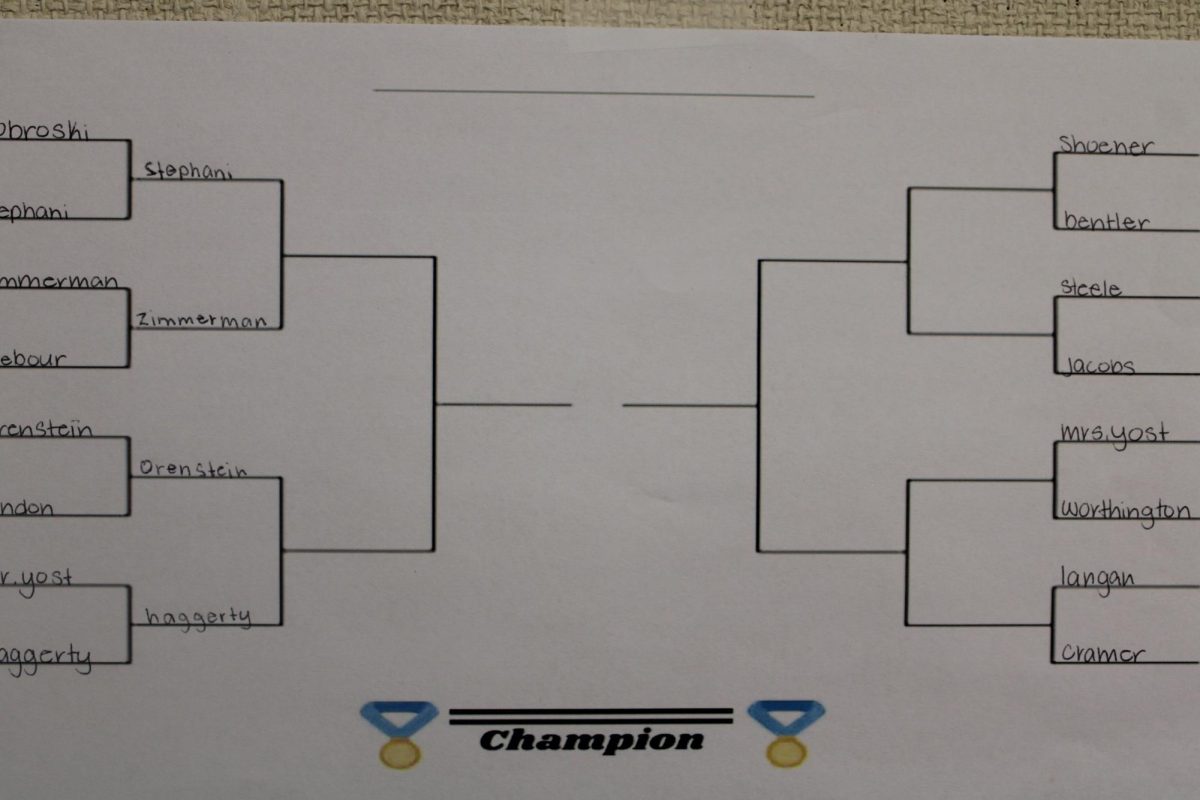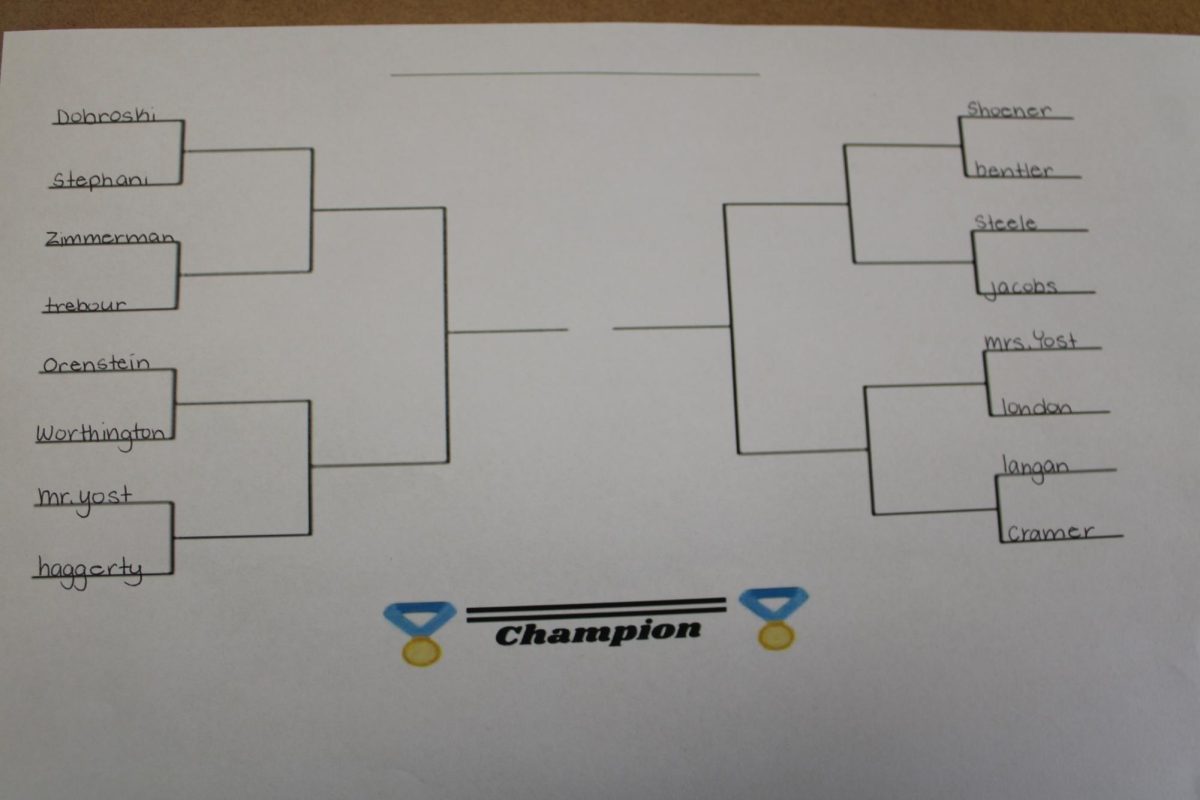Are women and men really equal?
Photo via Pixabay under the Creative Commons License
Only 14.2% of women hold top leadership positions in the S&P 500
February 1, 2017
In our American society, most people tend to feel that we live in a world where we provide equal opportunities for all people, regardless of race, sex, religion, etc. However, women are lagging behind in the fields of science, politics, and business around the world.
According to the U.S. Bureau of Labor statistics, women make up 47% of the workforce,but are highly under-represented in certain science and engineering occupations. Women make up only 20% of all members of Congress, and less than 25% of all state legislatures. Women are still barely represented in the corporate world, holding only 4.4% of the top CEO positions at S&P 500 companies during 2015. Does this astonishing gap exist because women are really different from men, or does sexism still exist in our society?
The truth is that women can accomplish as much as men. A new report from the Pew Research Center states that the majority of Americans feel that women are just as capable as men when it comes to being political and business leaders. Just plain sexism doesn’t seem like the answer. Perhaps it’s the biases that have been so ingrained in male executive leaders. Most Americans claim to hold equitable views: that men and women are equal. However, converting belief into practice is a much different matter.
It is important to keep in mind that one’s sex does not determine how successful someone will be in their chosen vocation. But women and men are different, and they do things differently, especially in the workplace. There has been no evidence, to suggest that one sex, can accomplish more than the other, inherently just based on whether they are male or female. It perhaps is cultural factors that influence how men and women do things differently in the workplace. But the main point is that women and men do things differently in the workplace, especially in today’s age.
“Indeed, women can be just as different in the professional world as they are in their personal lives,” said Drew Gannon, author of the Fiscal Times article “How Men and Women Differ in the Workplace.”
Many studies have shown that women tend to be more persuasive and eager to take up challenges, and they tend to be more of honest and harder workers than men. A 2009 study by Accenture, found that 70% of business women asked their bosses for a new challenge. You would think that men and women would equally ask their bosses for a new challenge, right? Studies have proven this wrong. From the Accenture study, less than half of the men polled asked for a new challenge. In addition, a poll from a career site known as theFit showed that 54% of women worked 9 to 11 hours per a day, compared to 41% of men.
More women than men were likely to express a willingness to work while on vacation. They were less likely to spend their sick days “playing hooky, taking a mental health day, suffering from a hangover, or interviewing for another job,” according to the Fiscal Times.
Aren’t these the qualities necessary for being successful in any occupation that you want to pursue? “In fact at every level, more women were rated by their peers, their bosses, their direct reports, and their other associates as better overall leaders than their male counterparts,” said Mr. Jack Zenger and Mr. Joseph Folkman, journalists for the Harvard Business Review. “Two of the traits where women outscored men to the highest degree-taking initiative and driving results.”
Malcolm Gladwell, author of “Blink”, a book that is a bestseller, describes a study that shows that although we may consciously not have biases against one sex/race, we unconsciously very much do. This could be the reason why women are lacking many leadership roles, although studies have proven that women could very well be great leaders.
Black and white women and men were carefully selected to be similar in every aspect (obviously, except for sex and race), and they pretended to shop for cars. The blacks were quoted higher prices than the whites, and the women higher prices than the men. None of the automobile salesmen was outwardly racist. But, they very well could have lost out on good deals by unconsciously judging them by their sex and appearances. Their rapid cognition of thinking was unconsciously racist. The point is that we are so used to African Americans and women being inferior, in a patriarchal society.
In order to solve this problem, we need to implement programs and initiatives that heavily provide support for girls in the business, political, and technology field. This could heavily improve the economy as well. Research has shown that everybody does better when women share the reins of power. “Female founded start ups outperformed all male teams,” said Tucker J. Marion, author of the Harvard Business Review article “4 Factors that Predict Start Up Success, and One That Doesn’t”.
Let’s break this bias against women, let’s prepare a future where women are equally represented as leaders of the nation.





















































































![A Promax Super Jumbo boombox (2014.270.2.1a) used as a prop by the character Radio Raheem in the Spike Lee directed picture, Do the Right Thing. The boombox includes a dual audio casette tape deck, an equilizer section, radio dial, coloured light display, and a pair each of 8 subwoofers, midranges, and tweeters. There are sections of red, yellow, and green electical tape with black ink text on the sides and top of the player. There are also rectangular black, green, and yellow Public Enemy stickers adhered to both the PR and PL side of the player. On the lower back of the boombox is handwritten text in gold ink reading [BROOKLYN, NY / 3/17/90 / To Gene / RADIO RAHEEM LIVES / LOVE, Spike Lee / FIGHT THE POWER]. There is a metal handle attached to the top of the player, around which two braided bracelets (black-and-white 2014.270.2.1b, coloured 2014.270.2.1c) and multi-coloured printed cloth (2014.270.2.1d) have been tied. The rewind button on the PR tape deck has fallen off but is stored with the boombox (2014.270.2.1e). The boombox had an audio cassette in the PR deck that has been removed (2014.270.2.2), titled JAZZ CLUB / Vocal. The cassette is off-white with black text and is printed with track titles, manufacturing information, and serial number. Date: 1980s. Record ID: nmaahc_2014.270.2.](https://shsnews.org/wp-content/uploads/2023/03/IMG-2612-1-475x309.jpg)

Megan Filipkowski • Jun 2, 2017 at 1:18 PM
Great article. Very interesting!
Anon • May 27, 2017 at 12:10 PM
I’m seeing too much underinformed feminism in these comments, so it’t time to “speak my mind”.
You seem to contradict yourself multiple times in this article. For one, you state and enforce the claim that “women can accomplish just as much as men”, yet you acknowledge that women are less represented in the industry than men, without giving reason for this- other than natural psychology (actual facts proving this psychology?). You did, however, make some very convincing points concerning both of these views, however, so I commend you for that. You seem well informed, but I sense much cherry picking here.
But I’m here to talk about these comments.
“Women are just as capable to do what a man does. Women are a huge reason why the world runs… people are bias to having a man lead rather than a woman.” If women are capable of doing the same things that a man does (disproven in the article), why has human psychology not adapted to this point of view, like it has done for several others before? If they “make the world run”, why are they not in these leadership positions through their hard work and ingenuity? I’d think that their capability would allow them to be on the same social plane as men, but, as the article states, this isn’t true.
I don’t mean to be overly critical, or at all sexist, in this comment- just constructive. Thanks for the read.
Sarah M • Apr 21, 2017 at 1:33 PM
In some cases men and women are treated equally. For example in schools are fine, but in society people looks at men and women differently. Women are more criticized by what they do and if a guy were to do it, they wouldn’t get talked about.
Justin Meserole • Sep 25, 2017 at 11:10 AM
But male suicide rates are pretty much double female suicides and there’s much more pressure for men to live up to manly expectations
Anaya white • Apr 21, 2017 at 12:14 PM
Women are just as capable to do what a man does . Women are a huge reason why the world runs . I don’t believe it’s straight sexism but yes people are bias to having a man lead rather then a women
Madisyn Fisher • Apr 20, 2017 at 12:20 PM
I think men and women should have equal rights but I think the world had done a good job the make it look like women have equal rights when infact we don’t. You can only tell we don’t have equal rights when you are looking for the differences. I think the strong headed women and the ones who want to make waves in this worldare still a long way from having an equal chance but it’s not impossible.
Daniel Ocasio • Apr 3, 2017 at 8:01 AM
It doesn’t matter what career we are in, what sex we are, and what race too, because we are all the same on the inside! Salary shouldn’t male a difference… We should all be payed the same thing, based on the workforce!
Dispite the sense of reality, we are truly shouldn’t not be judged! Nobody should be judged! The people who judge, they are only lookibg at the cover(person’s looks and acts), not the pages(his/her life story).
Don’t overlook a person’s aspects, but look at their heart(who they are as a person/deep within).
Just accept people for who they are, not what they do!
Natalie Martine • Mar 13, 2017 at 12:36 PM
Is google male or female?
~ google is female because it doesn’t let you finish a sentence before making a suggestion.
I think although not consciously I believe woman and men are held to different standards and looked at differently. Despite obvious physical differences a woman and a mans brain do work differently. Running for office for example, women tend to run if they know they have a shot in wining the desired position in that election, family life also interrupts career decisions and paths because most women desire a family life, being the more nurturing one typically, causes them to have to have a leave of absence from their occupation. they are also the ones who have to feed the baby in the first few months. I think society set forth roles for male and female and the only way to break free is to seek new standards.
Matthew Smith-Stewart • Mar 9, 2017 at 7:31 AM
You know why women and men aren’t equal? It’s because for some incomprehensible reason if there is ever a disaster (let’s use the Titanic for example) women get to leave with the children first, and my black ass is left to die. Yall can cry to be “equal” if you want but you can’t cherry pick what you want, it’s all or nothing.
Albin Deda • Mar 6, 2017 at 10:22 AM
the wage gap doesnt take account of the type of work , position , hours worked etc.
Steven William Miller • Mar 6, 2017 at 8:11 AM
I have to feel that women aren’t treated like equals ether and they problemly won’t for a while because of our thoughts of life in today’s world
Malayla • Mar 3, 2017 at 12:43 PM
This article was very well written and had some great points about practicing belief in the work field. I find it interesting that even though statistics have proven that women are open to new challenges and are capable of making progress in hard work, people are still subjective to that fact. I like the idea of making programs and initiatives to support girls in the business, political and technology field. I also find it interesting that during the social experiment played out, black people and women were bid a higher price than another of the opposite sex and race. Sad that things like this still exist but it’s amazing that people are able to acknowledge it and find ways to solve it. Even if it takes one step at a time.
anaya white • Mar 3, 2017 at 12:39 PM
women and men are so called suppose to be treated equally , right? and a lot of people seem to think they are. but in all reality they are not. men get more benefits then women and it is not fair. if a women can prove that she can do the task of a man or even better then why shouldn’t women get the same benefits. why don’t women get the same praise? because of the small fact they are women ? it is hidden sexism .
Ms. Walter • Mar 3, 2017 at 10:10 AM
Great job on your article, Alefyia! You should be VERY proud of yourself!!
Jessica • Mar 3, 2017 at 7:19 AM
I always thought that men and women were always equal but in some places they are not.
Dat Boi • Mar 2, 2017 at 7:25 AM
While I believe all people, men and women should have equal rights and opportunity, I do believe there are certain roles that both men and women are more optimized for and should capitalize on them. Men on average are physically stronger than woman, so it makes sense for roles requiring physical strength to be dominated by mostly men. (not saying women cannot fill these roles too, but it makes sense for the majority to be men). Women are naturally good communicators and are great multi-taskers. This trait is amazing for raising children, but also allows woman to be terrific bosses, managers, teachers etc. (Again, men could do the same. But like before, women are more naturally engineered for these sorts of tasks). To me, equality of genders is a society where both men and women have equal opportunity, but each role is filled and capitalized by both respective genders.